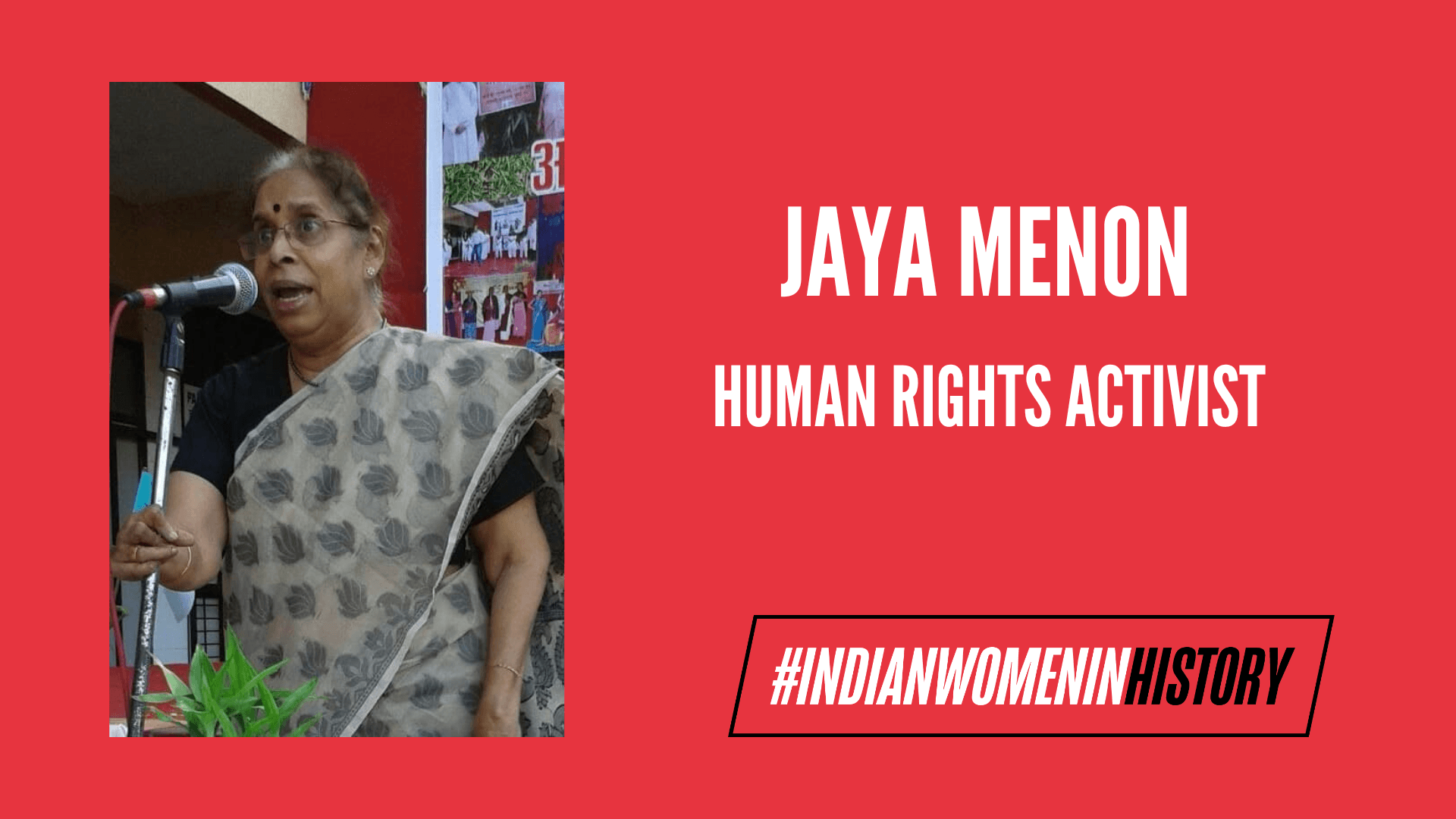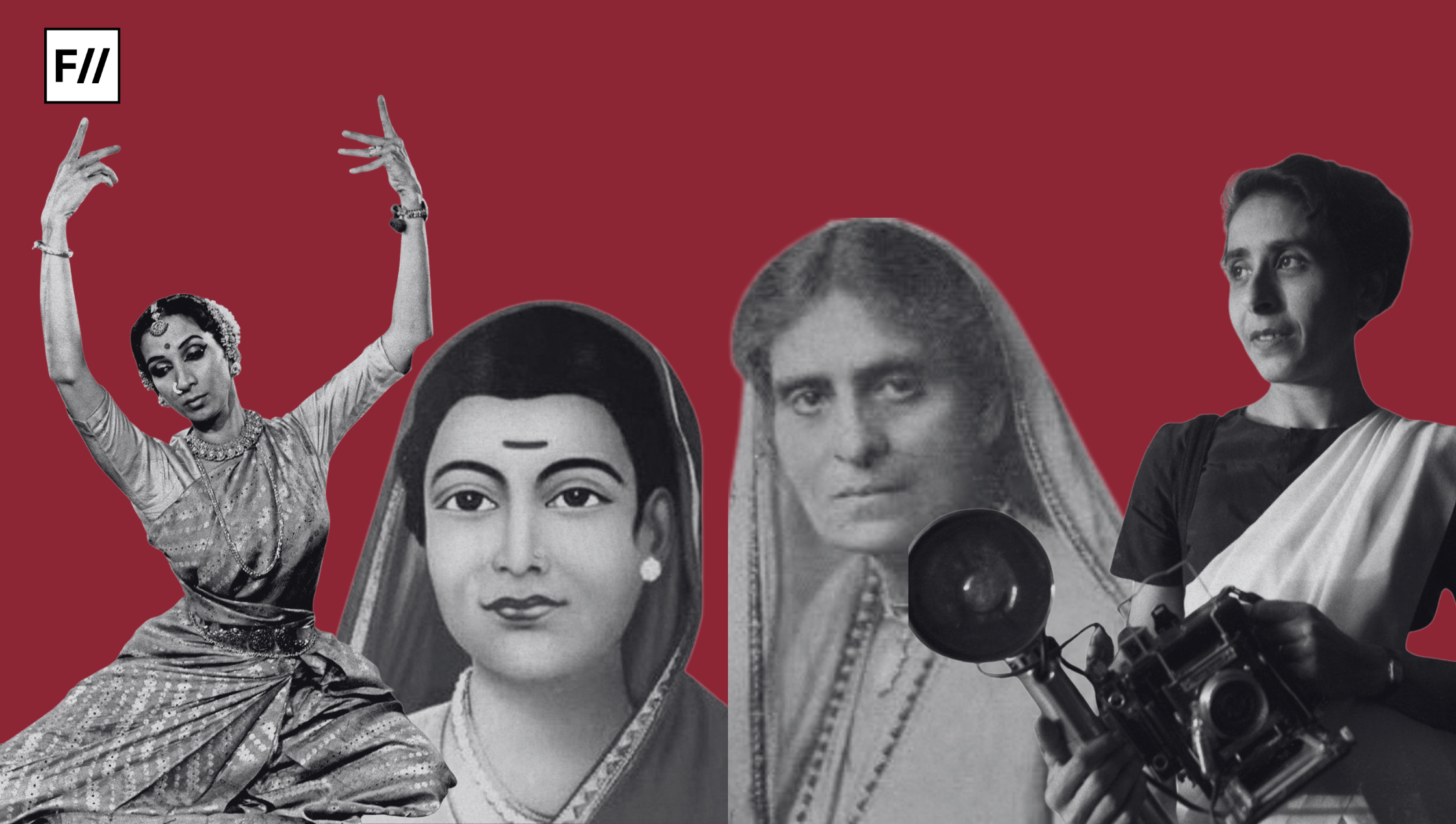Advocate Jaya Menon was an ardent human rights activist and a feminist working on grounds for the rights of the marginalised and underprivileged. Her demise on 9 June 2022 was a moment of grief for the discourse of right-based activism in India. Menon was an active part of several people’s movements based out of Mumbai, Maharashtra. She has been awarded degrees in the fields of law and social work. She was married to Prabhakar who was her comrade in human rights activism.
Jaya Menon along with her twin sister Laxmi Menon were partners in their commitment to the welfare of women and the working class. Her work ethic, political philosophy and contribution to the praxis of civil liberties and democratic rights galvanised through a series of movements, campaigns and organisations. The trajectory of her humane discourses covers a wide arena including the Church, women’s rights, legal discourses, human rights and many more.
Contribution to the Catholic Church
In the latter stages of her career as an advocate, she became a part of the Justice and Peace Commission (JPC) of the Archdiocese of Bombay. She was also an active member of the Institute for Community Research Organisation (ICOR) for over two decades. She joined the Legal Cell of the Justice and Peace Commission (JPC) as a lawyer-mediator. JPC was initiated in October 2003 as a result of the National Human Rights Education Workshop organised by JPC and the International Human Rights Education Consortium (IHREC) in Mumbai.
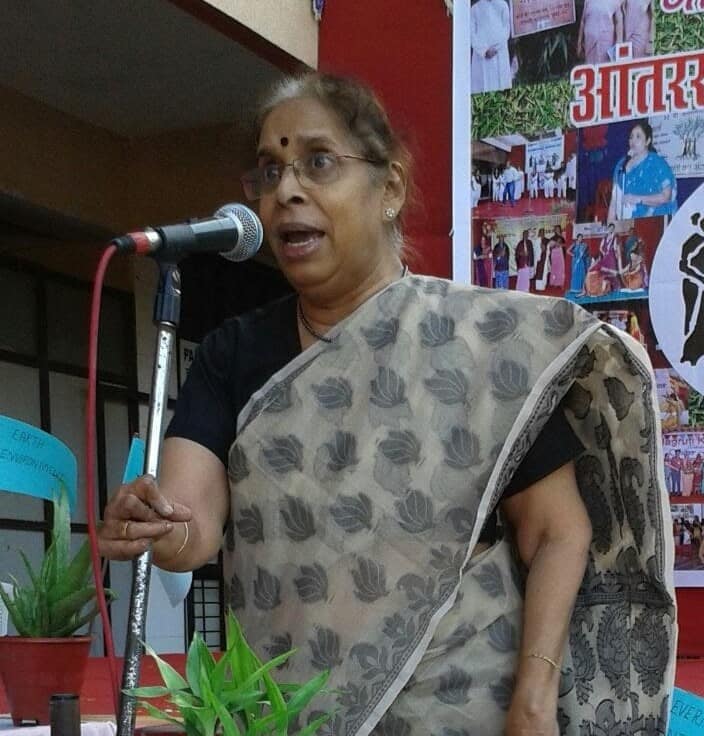
Gradually she became the most sought-after lawyer for the clients. Her service to the catholic church was greatly acknowledged by the diocese. She resolved various intrapersonal disputes pertaining to marriages, property issues, and legal disputes. Menon has also taught as a faculty at Archdiocesan Women’s Commission under the program ‘Towards a Discipleship of Equals.’ The programme explored the intersection of law and women’s rights. During this programme, she acquainted several intellectuals at St. Pius College. As an acknowledgement of her contribution to the church, The Examiner Catholic Newsweekly wrote in her obituary that, “she proclaimed the gospel of Jesus through her service to the Church in a big way.”
Feminism in India during the 1970s
Radha Kumar in her archival study The History of Doing divides the chronology of the emergence of feminist movements in India into three phases. The first phase was restricted to the advocacy of reforms led by men in the field of customs and education and the second phase focused on the presence of women in the Independence movement of 1930s-40s. Post-independence the women’s question became centred on the private space of the household and also rights of representation.
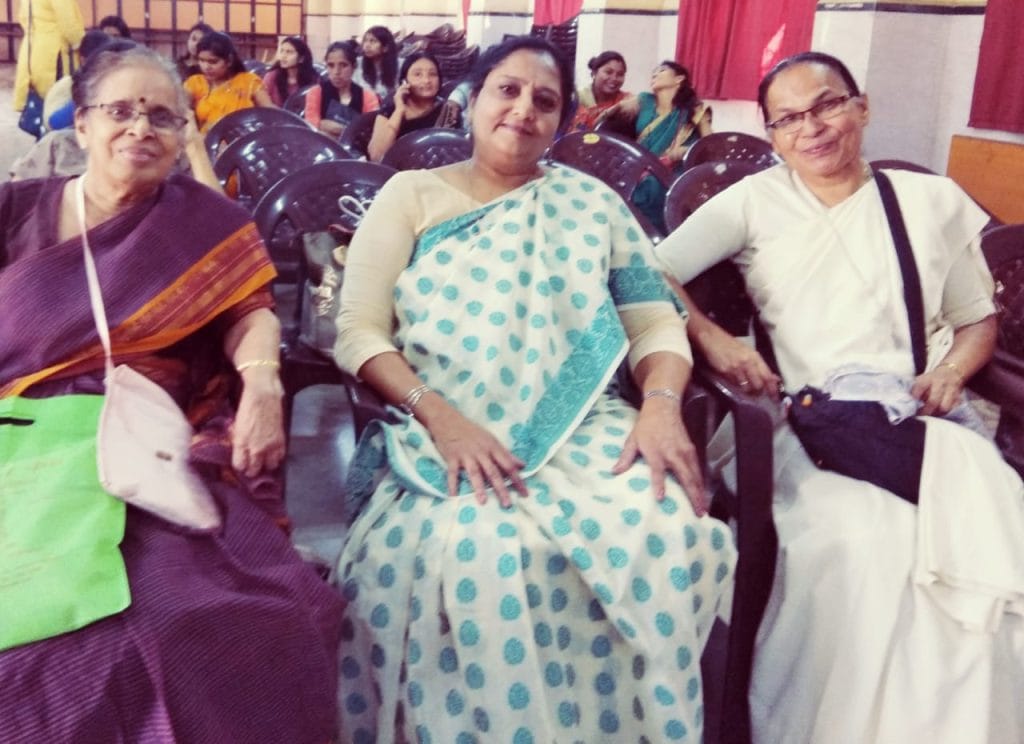
Feminism in India in colonial India was heralded by organisations like the Women’s India Association, The National Council of Women in India (NCWI), All India Women’s Conference amongst many others. However, the period of the 1960s-70s has been defined in feminist scholarship as a ‘period of crisis.’ It was during this crisis that Jaya Menon started with her groundwork and activism. The tumultuous period was characterised by various hardships for the landless farmers, the labourers and the working class.
The formation of the Progressive Organisation of Women initiated a series of women-led organisations which were aligned with the politics of the left. The celebration of March 8 as International Women’s Day and the proclamation OF 1974 as the International Women’s Year (IWY) by the United Nations hinted towards the rise of the women’s movement in the countries of the global north. It was against this backdrop that Menon became an active participant in the foundation of multiple organisations working for the rights of women and the working class.
Activism of Jaya Menon’s Organisations
Stree Jagruti Samiti (SJS) was founded in 1988 with the agenda of working for the labour rights and employment benefits of domestic workers. It was founded by Adv. Jaya Menon, her twin sister Laxmi Menon amongst other early feminists. The organisation has been instrumental in the rehabilitation of underaged forced into domestic work. At the grassroots level, the organisation has allied itself with local groups to address the distress of workers across the state. Currently, Geeta Menon is leading the organisation in the capacity of a secretary.
SJS has worked to build a society that doesn’t premise itself on exploitation and hierarchy. Through campaigns like cultural programmes, awareness programmes, surveys, and public sittings they approach domestic workers and try to address their grievances. The organisation also targets practices of child labour by surveying apartment complexes, talking to Resident’s Welfare Associations, and gathering information indirectly by talking to the residents.
She was a vocal protester who spoke up against the silence of political parties over the murder of Adivasi land rights activist, Navleen Kumar. Kumar was found stabbed in his Nalla Sopara building in 2002. Displaying her dismay Jaya Menon said, “Political parties have become so insensitive to the issues of the common man that the murder of someone who worked for the poor means nothing to them.”
Jaya Menon was also a coordinator of Women Networking, which began in 2001 and was notable for its flagship programme called “Campaign against Violence.” Menon and her twin sister Laxmi were central to Women Networking. They brought out various booklets and pamphlets addressing various social issues and contemporary challenges to social movements in India and the world.
Initiating a discourse on human rights education
Jaya Menon’s contribution to the Justice and Peace Commission of Mumbai overlapped with the initiative called Mumbai Initiatives for Human Rights Education (MIHRE). As a Human rights educator, Menon aligned with the initiative to “make young people become aware of various issues and inspire them to assist in the defense of human rights.” The organisation aimed to start a discourse in the understanding of human rights in consonance with the promotion of intercultural learning. A pamphlet issued by the Justice and Peace Commission, Mumbai said, “The long-term aim of such a program is to establish a culture where human rights are understood, defended and respected. The general objectives of the organisation are the promotion of gender equality, appreciation of cultural diversity, empowering people towards active citizenship and more.“
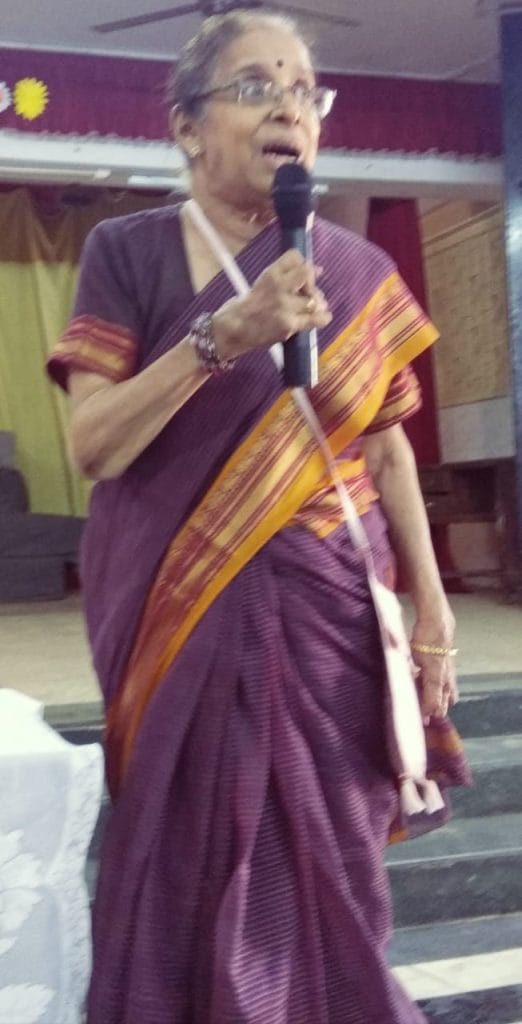
MIHRE has actively shown its involvement at the local level working with various target groups. Workshops organised under the banner of MIHRE with mediators like Menon taught human rights pedagogy to the teachers at a tertiary level. These workshops also discussed innovations in the curriculum.
Various workshops were held in Mumbai and a similar approach was also shown in a workshop held in Kerala, India. The discussion that followed included the rights of marginalised communities like Dalits and Tribals, the role of academic institutions in fostering a human right-based discourse, incarceration, capital punishment, law etc.
Between 2004 and 2006, JPC was active in the schools of Mumbai. The activity-based approach dealt with the conceptualisation of fundamental rights like the right to life with dignity, the right to equality, the right to freedom and justice and constitutional duties.
Legacy of Jaya Menon
In the contemporary phase of human rights discourse where the rights of the marginalised are under attack more than they have ever been before, it is important to remember activists who advocated solidarity amongst marginalised identities. Advocate Jaya Menon was one such personality lost in the pages of the internet. Her life is truly a lesson in resilience and assertion of human rights at the grassroots level.
The feminist comradeship that she contributed to lives on in organisations like Stree Jagruti Samiti, Justice and Peace Commission, Mumbai Initiatives for Human Rights Education (MIHRE) and Women Networking. Menon’s contribution to the people’s movement in India is an illustration of comradeship between various movements-feminist, working class, and human rights, that reiterate the importance of constitutional morality in India.
About the author(s)
Anchal is a writer, poet and spoken word artist based in New Delhi. Her works have been published on various platforms, including Enroute Indian History Blogs, Indian Review E-Journal and department and annual magazines of Miranda House, Kirori Mal College and Gargi College. Currently, she is pursuing an MA in English at Jawaharlal Nehru University, New Delhi and loitering around the city.
